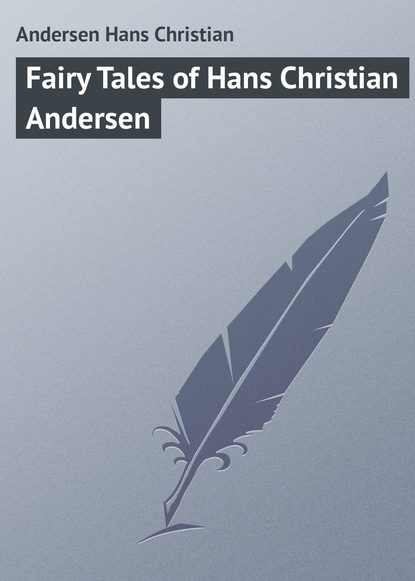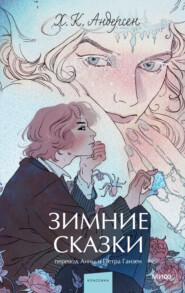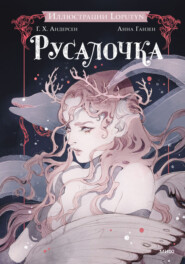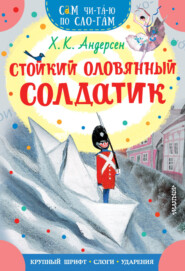По всем вопросам обращайтесь на: info@litportal.ru
(©) 2003-2024.
✖
Fairy Tales of Hans Christian Andersen
Настройки чтения
Размер шрифта
Высота строк
Поля
"Come, come," continued that thrilling voice, and the prince followed the call. At every step his cheeks glowed, and the blood rushed wildly through his veins. "I must follow," he cried; "it is not a sin, it cannot be, to follow beauty and joy. I only want to see her sleep, and nothing will happen unless I kiss her, and that I will not do, for I have strength to resist, and a determined will."
The fairy threw off her dazzling attire, bent back the boughs, and in another moment was hidden among them.
"I have not sinned yet," said the prince, "and I will not;" and then he pushed aside the boughs to follow the princess. She was lying already asleep, beautiful as only a fairy in the garden of paradise could be. She smiled as he bent over her, and he saw tears trembling out of her beautiful eyelashes. "Do you weep for me?" he whispered. "Oh weep not, thou loveliest of women. Now do I begin to understand the happiness of paradise; I feel it to my inmost soul, in every thought. A new life is born within me. One moment of such happiness is worth an eternity of darkness and woe." He stooped and kissed the tears from her eyes, and touched her lips with his.
A clap of thunder, loud and awful, resounded through the trembling air. All around him fell into ruin. The lovely fairy, the beautiful garden, sunk deeper and deeper. The prince saw it sinking down in the dark night till it shone only like a star in the distance beneath him. Then he felt a coldness, like death, creeping over him; his eyes closed, and he became insensible.
When he recovered, a chilling rain was beating upon him, and a sharp wind blew on his head. "Alas! what have I done?" he sighed; "I have sinned like Adam, and the garden of paradise has sunk into the earth." He opened his eyes, and saw the star in the distance, but it was the morning star in heaven which glittered in the darkness.
Presently he stood up and found himself in the depths of the forest, close to the cavern of the Winds, and the mother of the Winds sat by his side. She looked angry, and raised her arm in the air as she spoke. "The very first evening!" she said. "Well, I expected it! If you were my son, you should go into the sack."
"And there he will have to go at last," said a strong old man, with large black wings, and a scythe in his hand, whose name was Death. "He shall be laid in his coffin, but not yet. I will allow him to wander about the world for a while, to atone for his sin, and to give him time to become better. But I shall return when he least expects me. I shall lay him in a black coffin, place it on my head, and fly away with it beyond the stars. There also blooms a garden of paradise, and if he is good and pious he will be admitted; but if his thoughts are bad, and his heart is full of sin, he will sink with his coffin deeper than the garden of paradise has sunk. Once in every thousand years I shall go and fetch him, when he will either be condemned to sink still deeper, or be raised to a happier life in the world beyond the stars."
THE PEA BLOSSOM
There were once five peas in one shell, they were green, the shell was green, and so they believed that the whole world must be green also, which was a very natural conclusion. The shell grew, and the peas grew, they accommodated themselves to their position, and sat all in a row. The sun shone without and warmed the shell, and the rain made it clear and transparent; it was mild and agreeable in broad daylight, and dark at night, as it generally is; and the peas as they sat there grew bigger and bigger, and more thoughtful as they mused, for they felt there must be something else for them to do.
"Are we to sit here forever?" asked one; "shall we not become hard by sitting so long? It seems to me there must be something outside, and I feel sure of it."
And as weeks passed by, the peas became yellow, and the shell became yellow.
"All the world is turning yellow, I suppose," said they, – and perhaps they were right.
Suddenly they felt a pull at the shell; it was torn off, and held in human hands, then slipped into the pocket of a jacket in company with other full pods.
"Now we shall soon be opened," said one, – just what they all wanted.
"I should like to know which of us will travel furthest," said the smallest of the five; "we shall soon see now."
"What is to happen will happen," said the largest pea.
"Crack" went the shell as it burst, and the five peas rolled out into the bright sunshine. There they lay in a child's hand. A little boy was holding them tightly, and said they were fine peas for his pea-shooter. And immediately he put one in and shot it out.
"Now I am flying out into the wide world," said he; "catch me if you can;" and he was gone in a moment.
"I," said the second, "intend to fly straight to the sun, that is a shell that lets itself be seen, and it will suit me exactly;" and away he went.
"We will go to sleep wherever we find ourselves," said the two next, "we shall still be rolling onwards;" and they did certainly fall on the floor, and roll about before they got into the pea-shooter; but they were put in for all that. "We shall go farther than the others," said they.
"What is to happen will happen," exclaimed the last, as he was shot out of the pea-shooter; and as he spoke he flew up against an old board under a garret-window, and fell into a little crevice, which was almost filled up with moss and soft earth. The moss closed itself round him, and there he lay, a captive indeed, but not unnoticed by God.
"What is to happen will happen," said he to himself.
Within the little garret lived a poor woman, who went out to clean stoves, chop wood into small pieces and perform such-like hard work, for she was strong and industrious. Yet she remained always poor, and at home in the garret lay her only daughter, not quite grown up, and very delicate and weak. For a whole year she had kept her bed, and it seemed as if she could neither live nor die.
"She is going to her little sister," said the woman; "I had but the two children, and it was not an easy thing to support both of them; but the good God helped me in my work, and took one of them to Himself and provided for her. Now I would gladly keep the other that was left to me, but I suppose they are not to be separated, and my sick girl will very soon go to her sister above." But the sick girl still remained where she was, quietly and patiently she lay all the day long, while her mother was away from home at her work.
Spring came, and one morning early the sun shone brightly through the little window, and threw its rays over the floor of the room. Just as the mother was going to her work, the sick girl fixed her gaze on the lowest pane of the window – "Mother," she exclaimed, "what can that little green thing be that peeps in at the window? It is moving in the wind."
The mother stepped to the window and half opened it. "Oh!" she said, "there is actually a little pea which has taken root and is putting out its green leaves. How could it have got into this crack? Well now, here is a little garden for you to amuse yourself with." So the bed of the sick girl was drawn nearer to the window, that she might see the budding plant; and the mother went out to her work.
"Mother, I believe I shall get well," said the sick child in the evening, "the sun has shone in here so brightly and warmly to-day, and the little pea is thriving so well: I shall get on better, too, and go out into the warm sunshine again."
"God grant it!" said the mother, but she did not believe it would be so. But she propped up with the little stick the green plant which had given her child such pleasant hopes of life, so that it might not be broken by the winds; she tied the piece of string to the window-sill and to the upper part of the frame, so that the pea-tendrils might twine round it when it shot up. And it did shoot up, indeed it might almost be seen to grow from day to day.
"Now really here is a flower coming," said the old woman one morning, and now at last she began to encourage the hope that her sick daughter might really recover. She remembered that for some time the child had spoken more cheerfully, and during the last few days had raised herself in bed in the morning to look with sparkling eyes at her little garden which contained only a single pea-plant. A week after, the invalid sat up for the first time a whole hour, feeling quite happy by the open window in the warm sunshine, while outside grew the little plant, and on it a pink pea-blossom in full bloom. The little maiden bent down and gently kissed the delicate leaves. This day was to her like a festival.
"Our heavenly Father Himself has planted that pea, and made it grow and flourish, to bring joy to you and hope to me, my blessed child," said the happy mother, and she smiled at the flower, as if it had been an angel from God.
But what became of the other peas? Why the one who flew out into the wide world, and said, "Catch me if you can," fell into a gutter on the roof of a house, and ended his travels in the crop of a pigeon. The two lazy ones were carried quite as far, for they also were eaten by pigeons, so they were at least of some use; but the fourth, who wanted to reach the sun, fell into a sink and lay there in the dirty water for days and weeks, till he had swelled to a great size.
"I am getting beautifully fat," said the pea, "I expect I shall burst at last; no pea could do more that that, I think; I am the most remarkable of all the five which were in the shell." And the sink confirmed the opinion.
But the young maiden stood at the open garret window, with sparkling eyes and the rosy hue of health on her cheeks, she folded her thin hands over the pea-blossom, and thanked God for what He had done.
"I," said the sink, "shall stand up for my pea."
THE PEN AND THE INKSTAND
In a poet's room, where his inkstand stood on the table, the remark was once made, "It is wonderful what can be brought out of an inkstand. What will come next? It is indeed wonderful."
"Yes, certainly," said the inkstand to the pen, and to the other articles that stood on the table; "that's what I always say. It is wonderful and extraordinary what a number of things come out of me. It's quite incredible, and I really don't know what is coming next when that man dips his pen into me. One drop out of me is enough for half a page of paper, and what cannot half a page contain? From me, all the works of a poet are produced; all those imaginary characters whom people fancy they have known or met. All the deep feeling, the humor, and the vivid pictures of nature. I myself don't understand how it is, for I am not acquainted with nature, but it is certainly in me. From me have gone forth to the world those wonderful descriptions of troops of charming maidens, and of brave knights on prancing steeds; of the halt and the blind, and I know not what more, for I assure you I never think of these things."
"There you are right," said the pen, "for you don't think at all; if you did, you would see that you can only provide the means. You give the fluid that I may place upon the paper what dwells in me, and what I wish to bring to light. It is the pen that writes: no man doubts that; and, indeed, most people understand as much about poetry as an old inkstand."
"You have had very little experience," replied the inkstand. "You have hardly been in service a week, and are already half worn out. Do you imagine you are a poet? You are only a servant, and before you came I had many like you, some of the goose family, and others of English manufacture. I know a quill pen as well as I know a steel one. I have had both sorts in my service, and I shall have many more when he comes – the man who performs the mechanical part – and writes down what he obtains from me. I should like to know what will be the next thing he gets out of me."
"Inkpot!" exclaimed the pen contemptuously.
Late in the evening the poet came home. He had been to a concert, and had been quite enchanted with the admirable performance of a famous violin player whom he had heard there. The performer had produced from his instrument a richness of tone that sometimes sounded like tinkling waterdrops or rolling pearls; sometimes like the birds twittering in chorus, and then rising and swelling in sound like the wind through the fir-trees. The poet felt as if his own heart were weeping, but in tones of melody like the sound of a woman's voice. It seemed not only the strings, but every part of the instrument from which these sounds were produced. It was a wonderful performance and a difficult piece, and yet the bow seemed to glide across the strings so easily that it was as if any one could do it who tried. Even the violin and the bow appeared to perform independently of their master who guided them; it was as if soul and spirit had been breathed into the instrument, so the audience forgot the performer in the beautiful sounds he produced. Not so the poet; he remembered him, and named him, and wrote down his thoughts on the subject. "How foolish it would be for the violin and the bow to boast of their performance, and yet we men often commit that folly. The poet, the artist, the man of science in his laboratory, the general, – we all do it; and yet we are only the instruments which the Almighty uses; to Him alone the honor is due. We have nothing of ourselves of which we should be proud." Yes, this is what the poet wrote down. He wrote it in the form of a parable, and called it "The Master and the Instruments."
"That is what you have got, madam," said the pen to the inkstand, when the two were alone again. "Did you hear him read aloud what I had written down?"
"Yes, what I gave you to write," retorted the inkstand. "That was a cut at you because of your conceit. To think that you could not understand that you were being quizzed. I gave you a cut from within me. Surely I must know my own satire."
"Ink-pitcher!" cried the pen.
"Writing-stick!" retorted the inkstand. And each of them felt satisfied that he had given a good answer. It is pleasing to be convinced that you have settled a matter by your reply; it is something to make you sleep well, and they both slept well upon it. But the poet did not sleep. Thoughts rose up within him like the tones of the violin, falling like pearls, or rushing like the strong wind through the forest. He understood his own heart in these thoughts; they were as a ray from the mind of the Great Master of all minds.
"To Him be all the honor."
THE PHILOSOPHER'S STONE
Far away towards the east, in India, which seemed in those days the world's end, stood the Tree of the Sun; a noble tree, such as we have never seen, and perhaps never may see.
The summit of this tree spread itself for miles like an entire forest, each of its smaller branches forming a complete tree. Palms, beech-trees, pines, plane-trees, and various other kinds, which are found in all parts of the world, were here like small branches, shooting forth from the great tree; while the larger boughs, with their knots and curves, formed valleys and hills, clothed with velvety green and covered with flowers. Everywhere it was like a blooming meadow or a lovely garden. Here were birds from all quarters of the world assembled together; birds from the primeval forests of America, from the rose gardens of Damascus, and from the deserts of Africa, in which the elephant and the lion may boast of being the only rulers. Birds from the Polar regions came flying here, and of course the stork and the swallow were not absent. But the birds were not the only living creatures. There were stags, squirrels, antelopes, and hundreds of other beautiful and light-footed animals here found a home.
The summit of the tree was a wide-spreading garden, and in the midst of it, where the green boughs formed a kind of hill, stood a castle of crystal, with a view from it towards every quarter of heaven. Each tower was erected in the form of a lily, and within the stern was a winding staircase, through which one could ascend to the top and step out upon the leaves as upon balconies. The calyx of the flower itself formed a most beautiful, glittering, circular hall, above which no other roof arose than the blue firmament and the sun and stars.

















